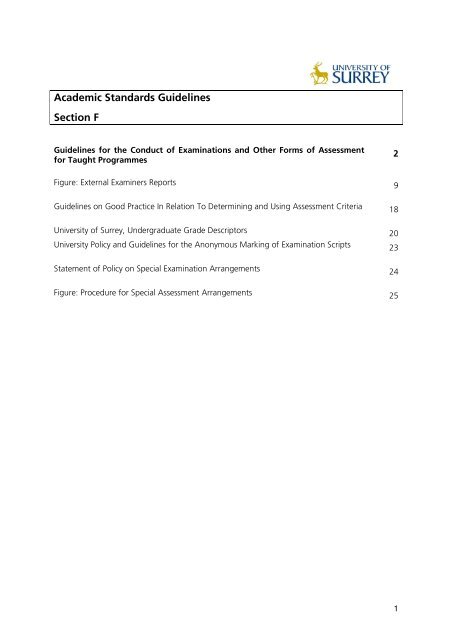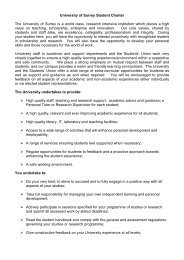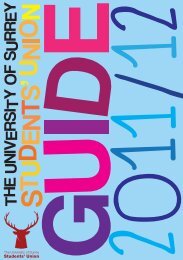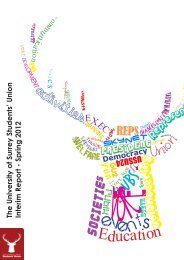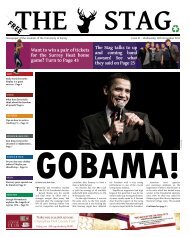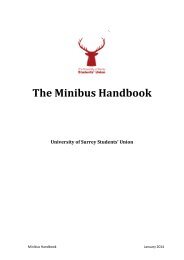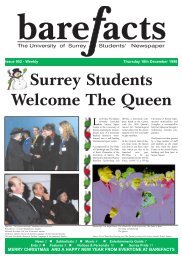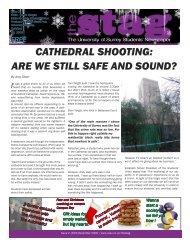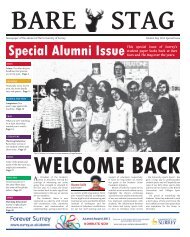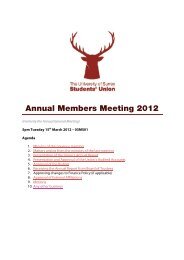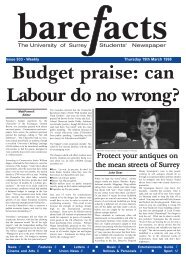asg section f - examinations and other forms of assessment
asg section f - examinations and other forms of assessment
asg section f - examinations and other forms of assessment
You also want an ePaper? Increase the reach of your titles
YUMPU automatically turns print PDFs into web optimized ePapers that Google loves.
Academic St<strong>and</strong>ards Guidelines<br />
Section F<br />
Guidelines for the Conduct <strong>of</strong> Examinations <strong>and</strong> Other Forms <strong>of</strong> Assessment<br />
for Taught Programmes<br />
2<br />
Figure: External Examiners Reports 9<br />
Guidelines on Good Practice In Relation To Determining <strong>and</strong> Using Assessment Criteria 18<br />
University <strong>of</strong> Surrey, Undergraduate Grade Descriptors 20<br />
University Policy <strong>and</strong> Guidelines for the Anonymous Marking <strong>of</strong> Examination Scripts 23<br />
Statement <strong>of</strong> Policy on Special Examination Arrangements 24<br />
Figure: Procedure for Special Assessment Arrangements 25<br />
1
Section F: Guidelines for the Conduct <strong>of</strong> Examinations <strong>and</strong> Other<br />
Forms <strong>of</strong> Assessment for Taught Programmes<br />
1 Scope <strong>of</strong> Guidelines<br />
These guidelines are concerned with procedures <strong>and</strong> documentation associated with<br />
the <strong>assessment</strong> <strong>of</strong> undergraduate <strong>and</strong> postgraduate taught programmes, including<br />
<strong>examinations</strong>, coursework, practical work, assignments <strong>and</strong> projects. These guidelines<br />
should be read in conjunction with the University's General Regulations that are set<br />
out in full in the University Calendar:<br />
http://portal.surrey.ac.uk/calendar/generalregs/index.jsp<br />
The pertinent General Regulations for this purpose are:<br />
General Regulations for First Degrees, Diplomas <strong>and</strong> Certificates for Students Pursuing<br />
Modular Programmes <strong>of</strong> Study<br />
General Regulations for the Degree(s) <strong>of</strong> Master (modular <strong>and</strong> non-modular)<br />
Regulations for Practitioner Doctorate (DBA, DClinPrac, EdD, EngD <strong>and</strong> PsychD)<br />
Regulations for Boards <strong>of</strong> Examiners<br />
Regulations for External Examining<br />
Regulations for the Conduct <strong>of</strong> Examinations <strong>and</strong> Other Forms <strong>of</strong> Assessment<br />
Regulations for Boards <strong>of</strong> Studies<br />
2 Board <strong>of</strong> Studies <strong>and</strong> Regulations<br />
2.1 Each Board <strong>of</strong> Studies is responsible for the organisation <strong>and</strong> implementation <strong>of</strong> the<br />
programme(s) <strong>of</strong> study for which it has been established. For each programme <strong>of</strong> study<br />
leading to an award <strong>of</strong> the University there shall be Programme Regulations, approved<br />
by the Quality & St<strong>and</strong>ards Subcommittee, which will include, inter alia:<br />
2.1.1 a clear statement <strong>of</strong> the scheme <strong>of</strong> <strong>assessment</strong> associated with each individual<br />
course/module <strong>and</strong> for the programme <strong>of</strong> study overall;<br />
2.1.2 requirements for the progression <strong>of</strong> students from one stage <strong>of</strong> the<br />
programme to an<strong>other</strong> (including procedures by which any failure to satisfy<br />
the examiners can be redeemed);<br />
2.1.3 requirements for the award <strong>of</strong> the target qualification;<br />
2.1.4 where appropriate, an indication <strong>of</strong> the way in which classifications or<br />
merits/distinctions will be determined;<br />
2.1.5 date approved by the Quality & St<strong>and</strong>ards Subcommittee.<br />
For closely related programmes it may be appropriate to have a single set <strong>of</strong> joint<br />
regulations.<br />
As a matter <strong>of</strong> principle, the Quality & St<strong>and</strong>ards Subcommittee will not approve<br />
retrospective revisions if those revisions might disadvantage students on programme,<br />
unless the students give their unanimous written consent.<br />
2.2 Faculties will be responsible for notifying students <strong>of</strong> the nature <strong>of</strong> any required<br />
coursework or projects, together with the deadlines for the submission <strong>of</strong> that work<br />
(see also Academic St<strong>and</strong>ards Guidelines: Communications with Students).<br />
2
3 Boards <strong>of</strong> Examiners<br />
3.1 For each programme <strong>of</strong> study leading to an award <strong>of</strong> the University, there shall be a<br />
Board <strong>of</strong> Examiners. The Quality & St<strong>and</strong>ards Subcommittee will approve arrangements<br />
for Boards <strong>of</strong> Examiners when programmes are validated or reviewed. When two or<br />
more programmes <strong>of</strong> study share a substantial part in common, the Quality &<br />
St<strong>and</strong>ards Subcommittee may determine that there will be a joint Board <strong>of</strong> Examiners.<br />
3.2 The Board <strong>of</strong> Examiners. is responsible to the Dean <strong>of</strong> Faculty(-ies) responsible for a<br />
programme <strong>of</strong> study <strong>and</strong> for the general conduct <strong>of</strong> the <strong>assessment</strong> for that<br />
programme, in accordance with the General <strong>and</strong> the more specific Programme<br />
Regulations. It will ensure that suitable arrangements are made for the setting, holding<br />
<strong>and</strong> marking <strong>of</strong> <strong>examinations</strong> <strong>and</strong> <strong>other</strong> <strong>forms</strong> <strong>of</strong> <strong>assessment</strong>.<br />
3.3 Regulations for Boards <strong>of</strong> Examiners, governing inter alia the establishment,<br />
membership, terms <strong>of</strong> reference, frequency <strong>and</strong> quorum for meetings for Boards <strong>of</strong><br />
Examiners, are set out in full in the University Calendar:<br />
http://portal.surrey.ac.uk/calendar/generalregs/index.jsp<br />
4 External Examiners<br />
4.1 The purposes <strong>of</strong> the system <strong>of</strong> external examining are:<br />
4.1.1 to ensure, first <strong>and</strong> foremost, that degrees <strong>and</strong> <strong>other</strong> academic qualifications<br />
awarded in similar subjects or disciplines are comparable in st<strong>and</strong>ard in<br />
different universities <strong>and</strong> institutions <strong>of</strong> higher education in the United<br />
Kingdom, though their content may vary;<br />
4.1.2 to ensure that the system <strong>of</strong> <strong>assessment</strong> is fair <strong>and</strong> is fairly operated in the<br />
determination <strong>and</strong>, where appropriate, classification <strong>of</strong> awards made to<br />
students.<br />
4.2 Regulations for External Examining are published annually in the University Calendar:<br />
http://portal.surrey.ac.uk/calendar/generalregs/index.jsp<br />
For each programme <strong>of</strong> study leading to an award <strong>of</strong> the University at least one<br />
external examiner shall be appointed.<br />
4.3 No degree or <strong>other</strong> academic qualification <strong>of</strong> the University may be awarded without<br />
participation in the process <strong>of</strong> examination <strong>and</strong> <strong>assessment</strong> by at least one external<br />
examiner.<br />
4.4 External examiners for taught programmes <strong>of</strong> study are appointed by the Senate<br />
Progression And Conferment Executive, acting with the delegated authority <strong>of</strong> the<br />
University Council. Upon appointment, an external examiner becomes a member <strong>of</strong><br />
the appropriate Board <strong>of</strong> Examiners ex <strong>of</strong>ficio.<br />
4.6 Eligibility for appointment as an external examiner is set out in Regulations for External<br />
Examining. The principles which underpin the rules on eligibility, however, are:<br />
4.6.1 that the individual must be impartial;<br />
4.6.2 that a nominee has, or has had within the previous four years, no close<br />
pr<strong>of</strong>essional link with the programme or Faculty/Department to which he/she<br />
is to be attached, or any close personal connection with staff or students, <strong>and</strong><br />
is not a current student at the University or at one <strong>of</strong> its Associated<br />
Institutions or has been a student within four years prior to the date <strong>of</strong><br />
commencement <strong>of</strong> the proposed appointment as external examiner;<br />
3
4.6.3 that the individual’s academic <strong>and</strong> / or pr<strong>of</strong>essional qualifications <strong>and</strong><br />
experience <strong>of</strong> teaching <strong>and</strong> <strong>assessment</strong> are appropriate in relation to the<br />
programme or specific component <strong>of</strong> the programme for which the<br />
appointment is being made <strong>and</strong> also, where appropriate, that to criteria<br />
specified by pr<strong>of</strong>essional or statutory bodies. [As a guide, a sole appointee as<br />
external examiner should ordinarily be <strong>of</strong> senior lecturer level or above.<br />
However, the University recognises that, in the interests <strong>of</strong> allowing<br />
individuals to gain experience, a less senior appointee may be appointed<br />
normally only when there is already at least one experienced serving external<br />
examiner In some disciplines, it is recognised that there may be only a small<br />
pool <strong>of</strong> eligible c<strong>and</strong>idates; in some instances, it may be appropriate to<br />
appoint an industry-based external examiner];<br />
4.6.4 that the individual has sufficient breadth <strong>of</strong> experience to be able to monitor<br />
<strong>and</strong> make judgements on the comparability <strong>of</strong> academic st<strong>and</strong>ards with<br />
similar programmes at the same level in <strong>other</strong> institutions;<br />
4.6.5 that programmes <strong>and</strong> <strong>assessment</strong> procedures should benefit from scrutiny by<br />
external examiners drawn over time from a wide range <strong>of</strong> institutional/<br />
pr<strong>of</strong>essional contexts <strong>and</strong> traditions;<br />
4.6.6 that appointees have the time to undertake the role <strong>of</strong> external examiner<br />
diligently <strong>and</strong> effectively <strong>and</strong> should therefore not be over-extended by their<br />
duties as external examiner. A nominee, who already holds two or more<br />
similar appointments at undergraduate level will not normally be appointed;<br />
4.6.7 that, wherever possible, appointments should not establish a close reciprocal<br />
external examining arrangements, for example, between programme teams or<br />
Faculties/Departments in a similar discipline. [SPACE may consider an<br />
appointment between institutions/ Faculties, however, where it can be<br />
demonstrated that the reciprocity is not within the same discipline or subject<br />
area <strong>and</strong> is such that neither examiner’s independence is compromised.]<br />
4.7 Before a nomination has been considered <strong>and</strong> agreed by the Board <strong>of</strong> Studies, an<br />
initial, informal approach should be made to the nominee by the Faculty. In so doing,<br />
the Faculty should ascertain that the nominee is eligible for appointment in accordance<br />
with the General Regulations. The nominee should be asked to confirm his/her<br />
eligibility by reading, signing <strong>and</strong> dating the Statement <strong>of</strong> Eligibility form (available<br />
from the Assistant Registrar (Quality Support) tel. 9108).<br />
4.8 Nominations for appointment or re-appointment as external examiners are submitted<br />
for approval to the Senate Progression And Conferment Executive) by the Board <strong>of</strong><br />
Studies. The submission <strong>of</strong> a nomination should be made via the Assistant Registrar<br />
(Quality Support) using the common Nomination Form (available from the Quality<br />
Support Section in Academic Registry), which provides information on:<br />
4.8.1 the nominating Faculty;<br />
4.8.2 the programme <strong>of</strong> study for which responsibility is to be taken (including,<br />
where appropriate, that part or parts <strong>of</strong> the programme or specific modules<br />
for which he/she will take particular responsibility);<br />
4.8.3 his/her title <strong>and</strong> name;<br />
4.8.4 his/her current academic/pr<strong>of</strong>essional position;<br />
4.8.5 his/her current address;<br />
4
4.8.6 sufficient information on the nominee's competence <strong>and</strong> experience to enable<br />
the Senate Progression And Conferment Executive to make an informed<br />
decision [In the case <strong>of</strong> an initial appointment, a nomination should be<br />
accompanied by a signed Eligibility Form <strong>and</strong> a curriculum vitae];<br />
4.8.7 the duration <strong>of</strong> the appointment or re-appointment, up to 3 consecutive years<br />
in the first instance, with automatic progression to one final year 1 ;<br />
4.8.8 the date from which the appointment will be effective (usually the beginning<br />
<strong>of</strong> the academic year in which the appointee will take up his/her duties).<br />
4.9 Once a nomination has been approved, the Assistant Registrar (Quality Support) will<br />
write formally to the individual, <strong>of</strong>fering him/her appointment. The letter <strong>of</strong><br />
appointment will:<br />
4.9.1 specify the award-bearing programme(s) (or subject area(s)) for which the<br />
individual is being appointed, together with any specific areas/modules <strong>of</strong> the<br />
syllabus for which he/she is asked to take particular responsibility;<br />
4.9.2 specify the period <strong>of</strong> appointment <strong>and</strong> starting date;<br />
4.9.3 indicate the fee that the external examiner should receive <strong>and</strong> explain the<br />
University's position with regard to the deduction <strong>of</strong> tax <strong>and</strong> NI at source, etc.;<br />
4.9.4 request the appointee's NI number;<br />
4.9.5 specify as a requirement the submission <strong>of</strong> an annual written report to the<br />
Vice-Chancellor;<br />
4.9.6 indicate that fees will not be paid unless the University receives an annual<br />
written report.<br />
4.10 With the letter <strong>of</strong> appointment, the Assistant Registrar (Quality Support) will send the<br />
new appointee:<br />
4.10.1 A copy <strong>of</strong> the Notes <strong>of</strong> Guidance <strong>and</strong> Regulations for External Examiners,<br />
included within which are the Regulations for External Examining <strong>and</strong><br />
Regulations for Boards <strong>of</strong> Examiners;<br />
4.10.2 a copy <strong>of</strong> the appropriate set(s) <strong>of</strong> General Undergraduate or Postgraduate<br />
Regulations;<br />
4.10.3 information on the level, structure <strong>and</strong> conditions <strong>of</strong> payment <strong>of</strong> fees <strong>and</strong><br />
travel/subsistence allowances (included in the Notes <strong>of</strong> Guidance <strong>and</strong><br />
Regulations for External Examiners).<br />
4.11 Following an individual’s appointment, the University <strong>and</strong> the appropriate Faculty(-ies)<br />
will be responsible for the induction <strong>of</strong> the external examiner <strong>and</strong> for communicating<br />
with him/her throughout the academic year. If induction is not facilitated through the<br />
University Induction Programme for External Examiners, which takes place annually for<br />
newly-appointed external examiners, Faculties should contact external examiners <strong>and</strong><br />
make separate arrangements as necessary.<br />
Induction by the Faculty should include:<br />
4.11.1 sending him/her a copy <strong>of</strong> the up-to-date Programme Regulations;<br />
4.11.2 sending him/her a copy <strong>of</strong> Faculty or Programme H<strong>and</strong>books, which outline<br />
the aims objectives structure <strong>and</strong> content <strong>of</strong> the definitive programme <strong>and</strong><br />
<strong>other</strong> relevant information, including any relevant Subject Benchmark<br />
Statement(s);<br />
1<br />
With effect from 1 September 2002, external examiners are now appointed for three years in the first instance.<br />
Their appointments will be extended automatically for a fourth <strong>and</strong> final year unless the Examinations Office is<br />
advised by the External Examiner or the Faculty/Department to the contrary.<br />
5
4.11.3 the arrangements for submitting schemes <strong>of</strong> <strong>assessment</strong> <strong>and</strong> draft<br />
examination papers for approval;<br />
4.11.4 advice on the schedule <strong>of</strong> <strong>assessment</strong>s for the academic year (if not already<br />
included in the above) <strong>and</strong> the likely timing <strong>of</strong> <strong>examinations</strong>, viva voce<br />
<strong>examinations</strong>, etc, which will be subject to external moderation;<br />
4.11.5 consulting <strong>and</strong> agreeing dates for meetings <strong>of</strong> the Board <strong>of</strong> Examiners <strong>and</strong>, in<br />
particular, for the final meeting;<br />
4.11.6 sending at the appropriate time a report form <strong>and</strong> claim form for fees<br />
(completed by the Faculty) <strong>and</strong> for travel/subsistence expenses.<br />
It is recommended that, if a newly-appointed external examiner is unable to attend<br />
the University’s Induction for External Examiners, he/she be invited by the Faculty to<br />
visit the University to meet with staff <strong>and</strong> students <strong>and</strong> to discuss the programme <strong>and</strong><br />
detailed arrangements for interaction between the external examiner <strong>and</strong> the Faculty.<br />
4.12 At the completion <strong>of</strong> the <strong>assessment</strong> each academic year (normally within six weeks <strong>of</strong><br />
the moderation <strong>of</strong> the final <strong>assessment</strong> for which they are responsible) <strong>and</strong> at the<br />
conclusion <strong>of</strong> their period <strong>of</strong> appointment, external examiners are required to submit<br />
to the Vice-Chancellor a written report on the <strong>assessment</strong> procedures <strong>and</strong> st<strong>and</strong>ards<br />
associated with the programme <strong>of</strong> study for which they are responsible. The report,<br />
employing a common pro-forma, invites comment upon:<br />
4.12.1 the programme <strong>of</strong> study itself (clarity <strong>of</strong> programme aims <strong>and</strong> learning<br />
outcomes; the structure <strong>and</strong> content <strong>of</strong> the programme in relation to the<br />
general aims <strong>and</strong> learning outcomes);<br />
4.12.2 the appropriateness <strong>of</strong> the method(s) <strong>of</strong> <strong>assessment</strong> for the stated learning<br />
outcomes (including knowledge, underst<strong>and</strong>ing, practical skills <strong>and</strong> key<br />
transferable skills, as appropriate) for the programme <strong>and</strong> / or individual<br />
modules;<br />
4.12.3 the congruence <strong>of</strong> the programme/award with external points <strong>of</strong> reference<br />
(e.g., the Framework for Higher Education Qualifications, relevant benchmark<br />
statement(s), pr<strong>of</strong>essional or statutory body st<strong>and</strong>ards);<br />
4.12.4 the appropriateness <strong>of</strong> the marking criteria used, <strong>of</strong> marks awarded <strong>and</strong> the<br />
overall range <strong>of</strong> marks in relation to the marking criteria;<br />
4.12.5 the consistency <strong>of</strong> marking within <strong>and</strong> between the modules/courses<br />
moderated;<br />
4.12.6 quality <strong>and</strong> consistency <strong>of</strong> written feedback to students;<br />
4.12.7 the organisation <strong>and</strong> administration <strong>of</strong> <strong>assessment</strong> procedures <strong>and</strong> the<br />
Faculty’s adherence to procedures, regulations <strong>and</strong> rules for the classification<br />
or division <strong>of</strong> awards.<br />
The pro- forma also includes a checklist which external examiners are asked to<br />
complete.<br />
4.13 The University will expect the Chair <strong>of</strong> the Board <strong>of</strong> Examiners to have invited the<br />
external examiners to make their observations <strong>and</strong> comments verbally <strong>and</strong> directly<br />
during formal meetings <strong>of</strong> the Board. When, for any reason, an external examiner is<br />
unable to attend a meeting <strong>of</strong> a Board <strong>of</strong> Examiners, he/she should be invited, to give<br />
written feedback, prior to the meeting, on the <strong>assessment</strong>s he/she has moderated.<br />
5 External Examiners' Reports<br />
5.1 Figure 8 illustrates the model system within the University for dealing with external<br />
examiners.’ reports described below.<br />
6
5.2 External report pro-formas will be issued to External Examiners by the Quality Support<br />
Section <strong>of</strong> the Academic Registry on appointment, or by Faculties. Copies <strong>of</strong> the<br />
report pro-forma can be accessed on the University web site at:<br />
http://portal.surrey.ac.uk/registry/qaeo/externals<br />
5.3 External examiners’ reports are generally regarded as confidential to the University but<br />
the report pro-forma indicates that they will be made available, for example, to<br />
representatives <strong>of</strong> the QAA <strong>and</strong> OFSTED, to appropriate statutory or pr<strong>of</strong>essional<br />
bodies <strong>and</strong> to members <strong>of</strong> a Periodic Review Panel. External examiners' reports may be<br />
made available to any <strong>other</strong> person or persons outside the University only with the<br />
prior agreement <strong>of</strong> the University <strong>and</strong> <strong>of</strong> the authors. However, in accordance with<br />
the provisions <strong>of</strong> the Data Protection Act 1998, information within a report relating to<br />
named individual students or members <strong>of</strong> staff may also be made available to those<br />
individuals on request but in summary form. External Examiners are advised that<br />
information relating to individuals must be attached to the report as a separate,<br />
confidential annex.<br />
5.4 External examiners' reports will be received on behalf <strong>of</strong> the Vice-Chancellor by the<br />
Senior Assistant Registrar (Quality Support), who will pass them immediately to the<br />
Registrar or his/her nominee. The Registrar or his/her nominee will arrange for copies<br />
to be made for distribution to the appropriate Dean <strong>of</strong> Faculty. The Registrar will draw<br />
to the attention <strong>of</strong> the Deputy Vice Chancellor (Academic Development) any matters <strong>of</strong><br />
particular concern.<br />
5.5 The Dean <strong>of</strong> Faculty will be responsible for ensuring that the reports are considered by<br />
the Board <strong>of</strong> Studies (<strong>and</strong> reported in the Annual Programme Review) <strong>and</strong>, where<br />
appropriate, by the Board <strong>of</strong> Examiners.. The reports may, if Faculties wish, be<br />
considered in summary form by the Board <strong>of</strong> Studies <strong>and</strong> Boards may choose to<br />
consider sensitive issues concerning named members <strong>of</strong> staff or students under<br />
“reserved business”. Actions arising from consideration <strong>of</strong> the external examiners.'<br />
reports should be recorded in the Minutes <strong>of</strong> the Board <strong>of</strong> Studies/Board <strong>of</strong> Examiners<br />
<strong>and</strong> promulgated through the University committees as appropriate. External<br />
examiners should be advised (preferably by letter from the Dean <strong>of</strong> Faculty) <strong>of</strong> the<br />
outcome <strong>of</strong> consideration <strong>of</strong> their reports <strong>and</strong> <strong>of</strong> specific actions which the Board <strong>of</strong><br />
Studies has agreed to take. The Faculty’s response should be copied to the Quality<br />
Support Section, Academic Registry.<br />
5.6 The Dean <strong>of</strong> Faculty will maintain a watching brief over all the programmes <strong>of</strong> study<br />
available within the Faculty. He/she may delegate this function to a person or group <strong>of</strong><br />
persons acting on his/her behalf. The Dean <strong>of</strong> Faculty, the nominated person or group<br />
<strong>of</strong> persons, will be responsible for ensuring that reports are considered <strong>and</strong> acted<br />
upon.<br />
5.7 External examiners' reports will ordinarily be considered as part <strong>of</strong> the documentation<br />
prepared by the Faculty for the periodic review <strong>of</strong> a programme <strong>of</strong> study.<br />
5.8 Upon receipt <strong>of</strong> a completed claim form, the Assistant Registrar (Quality Support) will<br />
authorise fee payment to the external examiner in accordance with the scale <strong>of</strong> fees<br />
approved by the University from time to time. Reimbursement <strong>of</strong> travel <strong>and</strong> subsistence<br />
expenses will also be made by the Assistant Registrar (Quality Support) in accordance<br />
with current University rates. Receipts in support <strong>of</strong> claims for subsistence must be<br />
submitted by the external examiners.<br />
5.9 No payment <strong>of</strong> a fee will be made unless <strong>and</strong> until the University has received an<br />
annual report from the external examiner.<br />
5.10 In the event that an external examiner fails to submit an expected annual report, the<br />
Quality Support Section will issue a reminder.<br />
7
5.11 If an external examiner fails to submit a written report in two consecutive years, the<br />
appointment will be terminated.<br />
Last revised: June 2009<br />
8
Figure 9 – External Examiners Reports<br />
External<br />
Examiner<br />
Quality Support Section<br />
Dean / Boards <strong>of</strong><br />
Studies<br />
Deputy Vice<br />
Chancellor (Ac Dev) /<br />
ULTC<br />
QSS provide<br />
annual summary<br />
report <strong>of</strong> principal<br />
issues arising<br />
from EE Reports<br />
for Q&SS<br />
Q&SS receives <strong>and</strong><br />
considers summary<br />
report <strong>and</strong> agrees<br />
actions as<br />
appropriate<br />
Annual<br />
Summary<br />
Report <strong>of</strong><br />
EE reports<br />
submitted to<br />
ULTC<br />
Serious issues referred to DVC (Ac Dev)<br />
External Examiner<br />
submits Annual<br />
Report <strong>and</strong> Fees<br />
Claim Form<br />
Report <strong>and</strong> Claim<br />
received by QSS<br />
QSS receives,<br />
reads, acknowledges<br />
<strong>and</strong> records Report<br />
on database. QSS<br />
writes to Dean,<br />
drawing attention to<br />
particular concerns<br />
(if applicable).<br />
Dean receives report<br />
<strong>and</strong> refers to Boards <strong>of</strong><br />
Studies for consideration<br />
Feedback to External Examiner (ideally a personal letter from Dean/HoD, copied to QSS)<br />
Key: Q&SS Quality & St<strong>and</strong>ards Subcommittee<br />
QSS Quality Support Section, Academic Registry<br />
ULTC University Learning & Teaching Committee<br />
Copy to QSS<br />
Board <strong>of</strong> Studies<br />
considers Report<br />
<strong>and</strong> agrees action(s)<br />
– Annual<br />
Programme Review<br />
9
6 Examinations Officers<br />
6.1 The University Examinations Officer is responsible for all administrative matters concerning<br />
<strong>examinations</strong>. These include:<br />
6.1.1 the maintenance <strong>and</strong> interpretation <strong>of</strong> the University's General Regulations;<br />
6.1.2 printing externally moderated examination papers <strong>and</strong> related security<br />
arrangements;<br />
6.1.3 preparing timetables for <strong>examinations</strong> <strong>and</strong> making appropriate arrangements for<br />
c<strong>and</strong>idates to sit <strong>examinations</strong> held in central locations;<br />
6.1.4 appointing invigilators on the recommendation <strong>of</strong> Faculties;<br />
6.1.5 presenting results to SPACE/RDC <strong>and</strong>, as appropriate, the Academic St<strong>and</strong>ards<br />
<strong>and</strong> Quality Assurance Committee;<br />
6.1.6 maintaining central records <strong>of</strong> marks <strong>and</strong> results;<br />
6.1.7 issuing <strong>of</strong> certificates to c<strong>and</strong>idates gaining awards <strong>of</strong> the University.<br />
The University Examinations Officer will advise Faculties on any matters concerned with<br />
<strong>examinations</strong> <strong>and</strong> <strong>assessment</strong> generally.<br />
6.2 Each Faculty shall have a designated Examinations Officer who will be responsible to the<br />
Dean <strong>of</strong> Faculty. In a large or complex Faculty there may be two or more Examinations<br />
Officers. Their roles may be split in relation to first degree programmes <strong>and</strong> postgraduate<br />
taught programmes or, in the case <strong>of</strong> modular programmes, the role may be even more<br />
disparate. In all cases, it is important for responsibilities to be clearly defined <strong>and</strong> the<br />
individuals clearly identified.<br />
6.3 Subject to the overall responsibility <strong>of</strong> the Dean <strong>of</strong> Faculty, the responsibilities <strong>of</strong> the<br />
Faculty Examinations Officer(s) will normally include:<br />
6.3.1 preparing draft examination timetables <strong>and</strong> liaising with the University<br />
Examinations Officer;<br />
6.3.2 arranging the preparation <strong>of</strong> draft examination papers;<br />
6.3.3 arranging for the production <strong>of</strong> camera-ready copy <strong>of</strong> externally assessed papers<br />
<strong>and</strong> its delivery to the Academic Registry;<br />
6.3.4 arranging for the checking <strong>of</strong> such papers when printed;<br />
6.3.5 arranging for the printing <strong>and</strong> secure storage <strong>of</strong> examination papers which are<br />
not externally assessed;<br />
6.3.6 proposing the names <strong>of</strong> invigilators for the Faculty's <strong>examinations</strong>;<br />
6.3.7 arranging for papers etc to be marked in accordance with the agreed time<br />
schedule;<br />
6.3.8 preparing mark sheets for meetings <strong>of</strong> the Board <strong>of</strong> Examiners <strong>and</strong> recording<br />
decisions thereon;<br />
6.3.9 conveying mark sheets <strong>and</strong> examiners' recommendations to the Academic<br />
Registry;<br />
6.3.10 retaining records <strong>of</strong> students' results;<br />
6.3.11 informing c<strong>and</strong>idates <strong>of</strong> the results <strong>of</strong> <strong>examinations</strong> <strong>and</strong> <strong>assessment</strong>s.<br />
The Faculty Examinations Officer(s) will be the principal point <strong>of</strong> contact with the<br />
Academic Registry on any matter regarding the Faculty's <strong>examinations</strong> <strong>and</strong> <strong>other</strong><br />
<strong>assessment</strong>s.<br />
10
7 Special Assessment Needs<br />
7.1 The Director <strong>of</strong> Studies should be aware <strong>of</strong> any declared special learning <strong>and</strong> / or<br />
<strong>assessment</strong> needs <strong>of</strong> individual students in relation to the programme <strong>of</strong> study under<br />
his/her direction, for seeking appropriate advice on ways <strong>of</strong> addressing <strong>and</strong> resolving those<br />
needs <strong>and</strong> for advising students <strong>of</strong> the procedures for applying for special examination<br />
arrangements.<br />
7.2 A Special Assessment Arrangements Committee is in place:<br />
• to consider the requirements with respect to <strong>examinations</strong> <strong>and</strong> <strong>other</strong> <strong>forms</strong> <strong>of</strong><br />
<strong>assessment</strong> for students with special needs;<br />
• to consult Faculties <strong>of</strong> the University regarding their students’ special needs;<br />
• to decide what special arrangements should be made for the <strong>assessment</strong> <strong>of</strong> each<br />
student, so that, as far as possible, he or she is neither advantaged or<br />
disadvantaged in comparison with <strong>other</strong> students.<br />
7.3 Students will be invited to make known to the Committee any documented or confirmed<br />
special needs by a published date in the first half <strong>of</strong> each semester. The appropriate<br />
procedure <strong>and</strong> designated dates will be published in the University’s Student H<strong>and</strong>book<br />
<strong>and</strong> in all Programme H<strong>and</strong>books (Academic St<strong>and</strong>ards Guidelines, Section D).<br />
The period <strong>of</strong> notice may be waived in unforeseen <strong>and</strong> exceptional circumstances.<br />
[The University’s Policy on Special Examination Arrangements is set out in<br />
Academic St<strong>and</strong>ards Guidelines, Section D]<br />
8 Setting <strong>of</strong> Examination Length, Papers, Marking <strong>and</strong> Moderation<br />
Formula for maximum examination length (written examination)<br />
8.1 The University sets a maximum limit for written examination length. The scheme gives a<br />
maximum <strong>of</strong> 12 hours <strong>of</strong> exams per year for a student taking 20-credit or 30-credit<br />
modules. Therefore, programmes should use the following formula:<br />
30- credit module = maximum <strong>of</strong> 3 hour exam<br />
20, 15 <strong>and</strong> 10-credit = maximum <strong>of</strong> 2 hour exam<br />
The examination length stated should be inclusive <strong>of</strong> ‘reading time’.<br />
8.2 The maximum time allowed should reflect the possibility that the <strong>assessment</strong> will be very<br />
largely based on the final exam. Broadly speaking, the intensity <strong>of</strong> teaching <strong>and</strong> learning<br />
will be the same, regardless <strong>of</strong> the size <strong>of</strong> the module, so that in principal a 20-credit<br />
module may have 2/3 the learning outcomes <strong>of</strong> a 30-credit module. There is a certain<br />
minimum "granularity" <strong>of</strong> an <strong>assessment</strong>, which argues against very short exams, even for<br />
10-credit modules.<br />
8.3 Associate Deans have authority to authorise exceptions to this level, where there is an<br />
academic necessity (not just an academic argument, or preference). Requests for a<br />
reduction in written examination length should be made via a programme’s Board <strong>of</strong><br />
Studies <strong>and</strong> Associate Deans should report any proposed changes to the Quality &<br />
St<strong>and</strong>ards Subcommittee.<br />
Preparation <strong>of</strong> Examination Papers<br />
11
8.4 The method <strong>of</strong> setting examination papers will vary between Faculties. For some<br />
courses/modules each paper may be set separately by one or two people while, for <strong>other</strong>s,<br />
it may be appropriate to hold a meeting <strong>of</strong> the Examiners to assemble the papers. It is<br />
essential that each complete draft is read by someone <strong>other</strong> than the setter(s) to<br />
ensure that the rubric is correct <strong>and</strong> that the questions are unambiguous <strong>and</strong> in<br />
good English.<br />
8.5 Draft papers for externally-assessed <strong>examinations</strong> must be sent to the external examiner(s)<br />
in adequate time for them to comment on them <strong>and</strong> for any disagreements to be resolved<br />
before the papers need to be printed. An external examiner should receive all the draft<br />
examination papers unless the external examiner has indicated to the Faculty that he/she<br />
wishes to receive only those papers for which he/she has a particular responsibility. When<br />
the answers to questions will be divided into distinct <strong>section</strong>s, a marking scheme should<br />
be sent with the draft papers (<strong>and</strong>, where appropriate, sample solutions or guidance on<br />
expectations) to the external examiner(s).<br />
8.6 The University Examinations Officer will inform Faculties <strong>of</strong> the dates by which papers<br />
should reach him/her for printing. The large volume <strong>of</strong> papers to be printed for the<br />
University <strong>and</strong> the Associated Institutions requires that these deadlines are<br />
observed. The University Examinations Officer should be informed immediately if there<br />
are problems with the compilation <strong>of</strong> particular papers.<br />
8.7 Faculties must make appropriate arrangements for the secure storage <strong>of</strong> draft examination<br />
papers <strong>and</strong> for their safe delivery to the University Examinations Officer. The University<br />
Examinations Officer is thereafter responsible for security arrangements relating to the<br />
printing <strong>and</strong> storage <strong>of</strong> papers.<br />
8.8 The University Library no longer retains printed copies <strong>of</strong> past examination papers, but<br />
makes them available in digital format. Faculties are required to submit all examination<br />
papers electronically to the Library ensuring any supplementary material provided to the<br />
c<strong>and</strong>idate at the time <strong>of</strong> the examination is also digitised <strong>and</strong> submitted with the paper. It<br />
is the responsibility <strong>of</strong> the Faculty to ensure that papers are uploaded <strong>and</strong> that precautions<br />
similar to those pertaining to printed papers are in place to ensure that <strong>examinations</strong><br />
papers are not released publicly before all c<strong>and</strong>idates have sat the paper.<br />
Marking<br />
8.9 The University operates a policy <strong>of</strong> anonymous marking for all written <strong>examinations</strong> (with<br />
effect from 1 September 1996) the details <strong>of</strong> which are set out in Appendix F3. Faculties<br />
are encouraged to consider anonymous marking <strong>of</strong> coursework, where possible <strong>and</strong><br />
practicable.<br />
8.10 The Faculty’s policy <strong>and</strong> practices with regard to marking should be made known to its<br />
internal <strong>and</strong> external examiner(s) alike.<br />
12
8.11 In February 2011 the University Senate approved generic grade descriptors for<br />
undergraduate programmes (Appendix F2). The principles embodied within the<br />
University Grade Descriptors should be a feature <strong>of</strong> assignment-specific marking schemes.<br />
These include:<br />
• clarity as to what constitutes work that represents the whole range <strong>of</strong> available<br />
marks (0% -100%),<br />
• the objectivity <strong>of</strong> the marking schemes, their alignment with the University Grade<br />
Descriptors, their match to the learning outcomes that are being assessed, <strong>and</strong><br />
their relevance to the form <strong>of</strong> <strong>assessment</strong> selected.<br />
Students should be made aware <strong>of</strong> University Grade Descriptors <strong>and</strong> how these relate to<br />
marking schemes for their assignments. It will be essential that, however the University<br />
Grade Descriptors are developed into marking schemes, staff are able to explain these<br />
marking schemes to students in discussions early in the students’ academic careers.<br />
The design <strong>of</strong> challenging assignments (beyond essays <strong>and</strong> exams that test knowledge<br />
recall) must happen alongside the use <strong>of</strong> the University Grade Descriptors <strong>and</strong> clearly<br />
aligned discipline-specific marking schemes since if there is no opportunity within the<br />
assignment for a student to demonstrate their higher level ability then this too will limit<br />
their ability to access marks at the higher end <strong>of</strong> the range.<br />
8.12 The marking <strong>of</strong> a written examination script must not be left entirely to one person. For<br />
examination answers in the form <strong>of</strong> calculations or short notes on a number <strong>of</strong> separate<br />
topics it is sufficient for a second person to check that all parts have been marked <strong>and</strong> that<br />
the marks have been totalled correctly.<br />
8.13 It is a requirement that, for essay-type answers, a sample <strong>of</strong> between 10% <strong>and</strong> 25% <strong>of</strong><br />
scripts (depending on numbers), as a minimum, should be second-marked by an<strong>other</strong><br />
internal marker (although it is desirable that all such answers are double-marked where<br />
practicable). The sample should be representative <strong>of</strong> the range <strong>of</strong> marks <strong>and</strong> include all<br />
borderline fails.<br />
8.14 All projects/dissertations must be double marked “blind” by internal examiners (i.e., that<br />
the marks <strong>of</strong> the first marker are not made known to the second marker in advance).<br />
Marking “blind” should not be confused with anonymous marking (ref. 8.6 above).<br />
8.15 Faculties /Departments should put in place a reliable system for ensuring consistency <strong>of</strong><br />
marking across the Faculty/Department. Criteria for marking must be stated clearly for the<br />
benefit <strong>of</strong> students, internal <strong>and</strong> external markers. This is particularly important where<br />
individual projects, dissertations or theses are concerned since the topics may be diverse.<br />
If, for any given assignment or examination, a number <strong>of</strong> marks are to be awarded<br />
specifically for spelling <strong>and</strong> grammar, the Faculty must make this known to all students in<br />
advance <strong>of</strong> the <strong>assessment</strong>.<br />
8.16 Faculties /Departments must make efforts to ensure uniformity <strong>of</strong> marking across the<br />
range <strong>of</strong> topics. Faculties /Departments should also put in place a mechanism for the<br />
reconciliation <strong>of</strong> marks in cases where internal examiners have recorded very different<br />
marks for the same work, before projects/dissertations are referred to the external<br />
examiner(s) for moderation.<br />
Illegible Scripts<br />
8.17 Occasionally an examiner may be presented with a script which is illegible. In such<br />
instances the following guidance should be used:<br />
8.17.1 the responsibility for determining that a script is illegible resides with the Board<br />
<strong>of</strong> Examiners or through consultation with the Chair <strong>of</strong> the Board <strong>and</strong> the<br />
external examiner(s), never an individual examiner;<br />
13
8.17.2 at its discretion, the Board <strong>of</strong> Examiners may require the c<strong>and</strong>idate, at his/her<br />
own expense, to reproduce the answer in legible form under such conditions <strong>and</strong><br />
within a timescale specified by the Board;<br />
8.17.3 the original script should be retained by the examiner(s) for the purposes <strong>of</strong><br />
comparison;<br />
8.17.4 the Board <strong>of</strong> Examiners has discretion to determine the appropriate course <strong>of</strong><br />
action to be followed, having due regard to: (i) the overall circumstances <strong>and</strong> (ii)<br />
the timescale;<br />
8.17.5 notwithst<strong>and</strong>ing the foregoing clauses, the Board <strong>of</strong> Examiners shall take into<br />
consideration the particular circumstances <strong>of</strong> students who are known to have<br />
special needs <strong>and</strong> may, in cases <strong>of</strong> doubt, advise a student whose script is<br />
deemed illegible to seek pr<strong>of</strong>essional help.<br />
External Moderation<br />
8.18 Faculty Examinations Officers should ascertain from the external examiner(s) in advance<br />
whether he/she wishes to moderate scripts or coursework “blind”. Very <strong>of</strong>ten, however,<br />
the external examiner(s) will wish to underst<strong>and</strong> from remarks on the marked script or<br />
separate sheet the basis on which the internal examiners(s) has awarded the marks.<br />
Coursework may have to be photocopied or temporarily returned to the Faculty to be<br />
available for the external examiner for moderation.<br />
8.19 The external examiner should not be expected to act as a second marker per se or to remark<br />
all examination scripts. Except where the number <strong>of</strong> c<strong>and</strong>idates is very small, the<br />
external examiner will <strong>of</strong>ten moderate only a sample <strong>of</strong> scripts; this sample should include<br />
c<strong>and</strong>idates assessed by internal examiners at the top, middle <strong>and</strong> bottom <strong>of</strong> the range <strong>and</strong><br />
should ordinarily include the scripts <strong>of</strong> c<strong>and</strong>idates who are likely to fail <strong>and</strong> those <strong>of</strong><br />
c<strong>and</strong>idates potentially eligible for the award <strong>of</strong> first class honours or a distinction. If the<br />
external examiner chooses not to receive all the scripts, the nature <strong>and</strong> method <strong>of</strong><br />
selection <strong>of</strong> the sample should be agreed with him/her in advance.<br />
8.20 It is not expected that an external examiner will wish to moderate all assessed coursework<br />
but a selection <strong>of</strong> coursework which makes a significant contribution to the programme<br />
should be available for moderation by the external examiner. The method <strong>of</strong> selection<br />
should be discussed <strong>and</strong> agreed with the external examiner in advance.<br />
It is not unusual for an external examiner to look at a considerable number <strong>of</strong><br />
projects/dissertations, however.<br />
8.21 Programme h<strong>and</strong>books may stipulate that some or all <strong>of</strong> the c<strong>and</strong>idates will be examined<br />
orally <strong>and</strong> / or by performance. If only some c<strong>and</strong>idates are so examined, the external<br />
examiner should be involved in determining the method <strong>of</strong> selection. Even though no oral<br />
or performance-based examination may be specified in the Programme H<strong>and</strong>book, the<br />
General Regulations do provide for any c<strong>and</strong>idate to be examined orally in addition to the<br />
methods <strong>of</strong> <strong>assessment</strong> specified <strong>and</strong> at the discretion <strong>of</strong> the Board <strong>of</strong> Examiners.<br />
14
9 Assessment <strong>and</strong> Feedback to Students<br />
9.1 It is a requirement, when determining the <strong>assessment</strong> requirements for a programme,<br />
that:<br />
• all modules should include at least one opportunity to provide students with<br />
evaluative feedback on their work from which they can judge how they have<br />
performed <strong>and</strong> how they can improve;<br />
• students are provided in advance <strong>of</strong> undertaking an assignment or <strong>other</strong> form <strong>of</strong><br />
<strong>assessment</strong> with the criteria on which their work will be assessed [Guidelines on<br />
good practice in relation to determining <strong>and</strong> using <strong>assessment</strong> criteria are set out<br />
in Appendix F1].<br />
• that <strong>assessment</strong> <strong>of</strong> any module by formal examination shall be restricted to a<br />
maximum <strong>of</strong> 80% <strong>of</strong> the total marks for a given academic level;<br />
9.2 It is also a requirement that:<br />
• for formative assignments <strong>and</strong> exercises on which students would normally expect<br />
to receive feedback, that the module/programme documents <strong>and</strong> relevant<br />
<strong>assessment</strong> guides should specify how long after submission the students will<br />
receive such feedback. Feedback would be given to students within 4 weeks <strong>of</strong><br />
submission <strong>and</strong> this normally would be at least one week before the submission<br />
date for subsequent <strong>and</strong> related assignments.<br />
10 Consideration <strong>and</strong> Promulgation <strong>of</strong> Results<br />
10.1 The Faculty Examination Officer(s) will prepare a mark sheet. The format will vary from one<br />
programme to an<strong>other</strong> <strong>and</strong> the mark sheet may be prepared by computer or manually.<br />
The mark sheet should serve both to provide the Board <strong>of</strong> Examiners with full information<br />
about each c<strong>and</strong>idate <strong>and</strong> to provide a record in future years (for providing references,<br />
transcripts etc). It is best if all marks are expressed as percentages for easy comparison; the<br />
weighting <strong>of</strong> each mark in the overall total should be clearly indicated. Column headings<br />
should be clear <strong>and</strong>, if abbreviations are used to save space, a key should be provided.<br />
See also Examination Office Guidance on the Preparation <strong>of</strong> Results.<br />
10.2 The Board <strong>of</strong> Examiners will consider each c<strong>and</strong>idate in turn. Any agreed change in marks<br />
should be entered on the mark sheet by crossing out the original entry <strong>and</strong> inserting the<br />
new figure. The result for each c<strong>and</strong>idate should be entered when agreed. The Board <strong>of</strong><br />
Examiners may wish to take factors <strong>other</strong> than the total mark into account in determining<br />
whether a c<strong>and</strong>idate has passed or gained a certain class but it is important that equal<br />
consideration is given to all c<strong>and</strong>idates near the same borderline. The Board <strong>of</strong> Examiners<br />
has a duty to consider any mitigating or extenuating circumstances which relate to either<br />
examination or <strong>other</strong> <strong>forms</strong> <strong>of</strong> <strong>assessment</strong> which may have impaired a c<strong>and</strong>idate's<br />
performance (see Section F <strong>of</strong> the Regulations). The Board <strong>of</strong> Examiners must also consider<br />
the situation <strong>of</strong> c<strong>and</strong>idates who were absent from an examination [including those who<br />
were entitled to resit but who failed to do so] <strong>and</strong> make recommendations. When all<br />
recommendations have been decided for all c<strong>and</strong>idates, the Chair should sign the mark<br />
sheet, as should the external examiner(s) in the case <strong>of</strong> externally assessed <strong>examinations</strong>.<br />
10.3 The Dean <strong>of</strong> Faculty is responsible for informing c<strong>and</strong>idates <strong>of</strong> the results <strong>of</strong> <strong>examinations</strong><br />
<strong>and</strong> <strong>other</strong> <strong>forms</strong> <strong>of</strong> <strong>assessment</strong>. This may be done before the results have been approved<br />
by the Senate Progression And Conferment Executive [<strong>and</strong> when awards are to be made],<br />
provided the list or letters make it clear that the results are provisional <strong>and</strong> may be subject<br />
to change.<br />
15
10.4 A list <strong>of</strong> the recommendations <strong>of</strong> the Board <strong>of</strong> Examiners, together with a signed copy <strong>of</strong><br />
the mark sheet, should be brought to the University Examinations Officer as soon as<br />
possible after the conclusion <strong>of</strong> the meeting. When awards are to be made, the<br />
recommendations are entered into the computer <strong>and</strong> the lists provided for the Senate<br />
Progression And Conferment Executive <strong>and</strong> Senate are printed by computer. This ensures<br />
that the University records, the Gazette <strong>and</strong> the certificates are the same but does mean<br />
the computer lists require careful checking by Faculties. The processing <strong>and</strong> storage <strong>of</strong><br />
c<strong>and</strong>idates' marks by computer or <strong>other</strong> means must accord with the provisions <strong>of</strong> the<br />
Data Protection Act 1998.<br />
10.5 Each c<strong>and</strong>idate shall be told his or her marks on a confidential basis if he or she so<br />
requests. In accordance with the Data Protection Act 1998 students may, if they wish, be<br />
shown their marked examination scripts. Scripts may not be returned to c<strong>and</strong>idates on a<br />
permanent basis.<br />
11 Retention <strong>of</strong> Examination Scripts / Dissertations<br />
11.1 Faculties must make arrangements to retain marked examination scripts for at least 12<br />
months after they have been considered by the Board <strong>of</strong> Examiners. Scripts should be<br />
retained securely (e.g. in a locked filing cabinet) <strong>and</strong> access accorded only to academic <strong>and</strong><br />
<strong>other</strong> staff with a legitimate right to consult them.<br />
11.2 In the event that a student submits a formal appeal to the University, Faculties should<br />
retain copies <strong>of</strong> the appellant’s <strong>examinations</strong> scripts, coursework, dissertation or thesis,<br />
<strong>and</strong> <strong>other</strong> documents until the appeal has run its course.<br />
11.3 Faculties are advised, in the approach to Institutional or <strong>other</strong> form <strong>of</strong> Audit by the QAA,<br />
to an accreditation visit by a pr<strong>of</strong>essional body or to some <strong>other</strong> form <strong>of</strong> review to ensure<br />
that they have available a representative sample <strong>of</strong> assessed work across the full marking<br />
spectrum.<br />
11.4 Other than 10.2 <strong>and</strong> 10.3 above, the University does not require Faculties to retain copies<br />
<strong>of</strong> undergraduate dissertations, project reports or <strong>other</strong> <strong>forms</strong> <strong>of</strong> substantive coursework.<br />
11.5 The University Library will only retain Master’s dissertations, with the exception <strong>of</strong> M.Phil<br />
dissertations for a period <strong>of</strong> eight years. Faculties wishing to retain theses for a longer<br />
period than this should do so on a Departmental basis.<br />
11.6 Faculties are required to adhere to the principles <strong>of</strong> the Data Protection Act 1998, viz:<br />
11.6.1 personal data shall be processed fairly <strong>and</strong> lawfully;<br />
11.6.2 personal data shall be obtained only for one or more specified <strong>and</strong> lawful<br />
purposes, <strong>and</strong> shall not be further processed in any manner incompatible with<br />
that purpose or those purposes;<br />
11.6.3 personal data shall be adequate, relevant <strong>and</strong> not excessive in relation to the<br />
purpose or purposes for which they are processed;<br />
11.6.4 personal data shall be accurate <strong>and</strong>, where necessary, kept up to date;<br />
11.6.5 personal data processed for any purpose shall not be kept for longer than is<br />
necessary for that purpose or those purposes;<br />
11.6.6 personal data shall be processed in accordance with the rights <strong>of</strong> data subjects<br />
under the Act;<br />
11.6.7 appropriate technical <strong>and</strong> organisational measures shall be taken against<br />
unauthorised or unlawful processing <strong>of</strong> personal data <strong>and</strong> against accidental loss<br />
or destruction <strong>of</strong>, or damage to, personal data;<br />
16
11.6.8 personal data shall not be transferred to a country or territory outside the<br />
European Economic Area unless that country or territory ensures an adequate<br />
level <strong>of</strong> protection for the rights <strong>and</strong> freedoms <strong>of</strong> data subjects in relation to the<br />
processing <strong>of</strong> personal data.<br />
Approved by Senate: October 1992<br />
Last Revised: July 2011<br />
17
Appendix F1: Guidelines on Good Practice In Relation To<br />
Determining <strong>and</strong> Using Assessment Criteria<br />
The key question when setting an assignment should be “What, exactly, do I want the students<br />
to demonstrate about their learning in this assignment” Careful consideration <strong>of</strong> this question<br />
should ensure alignment between the assignment tasks <strong>and</strong> the intended module outcomes,<br />
<strong>and</strong> facilitate the development <strong>of</strong> clear <strong>assessment</strong> criteria that may be made explicit for the<br />
benefit <strong>of</strong> students.<br />
Assessment criteria specify what a student must be able to do to achieve a pass, or to achieve a<br />
particular grade. The use <strong>of</strong> appropriate criteria facilitates the provision <strong>of</strong> feedback to students<br />
<strong>and</strong> may also link to a self-<strong>assessment</strong> cover sheet where the students indicate how their<br />
answers seek to meet the dem<strong>and</strong>s <strong>of</strong> the assignment.<br />
Supposing that you decide that the following areas need to be evidenced (the particular traits<br />
will, <strong>of</strong> course, differ according to the subject area <strong>and</strong> type <strong>of</strong> <strong>assessment</strong>):<br />
• Knowledge <strong>and</strong> underst<strong>and</strong>ing <strong>of</strong> particular content<br />
• Critical analysis <strong>of</strong> conflicting evidence<br />
• A range <strong>of</strong> sources used appropriately<br />
• A well-structured argument<br />
• Language <strong>and</strong> expression<br />
These may be incorporated into a matrix which shows how well each <strong>of</strong> these traits is<br />
demonstrated using a scale from 1-5.<br />
Assignments can be graded by scoring them for each factor on the five point scale. Overall<br />
percentages are derived by applying a weighting to the factor relative to its importance, so that<br />
the total possible marks are 100. So, for example, critical analysis <strong>of</strong> conflicting evidence may be<br />
weighted x5 while underst<strong>and</strong>ing <strong>of</strong> relevant content is weighted x3, <strong>and</strong> so on. Again, the<br />
relative weighting <strong>of</strong> categories will depend on the level at which the student is studying.<br />
A sample matrix is shown below 2 :<br />
Knowledge Critical Sources Argument Language<br />
1 Little or no<br />
evidence <strong>of</strong><br />
familiarity with<br />
content <strong>of</strong><br />
module<br />
Little or no<br />
evidence <strong>of</strong> critical<br />
evaluation <strong>of</strong><br />
material<br />
Sources not<br />
used to<br />
support<br />
substantive<br />
assertions or<br />
argument<br />
Either no<br />
discernible, or<br />
seriously<br />
flawed<br />
academic<br />
argument<br />
The<br />
assignment<br />
has<br />
unacceptable<br />
failings in<br />
structure <strong>and</strong> /<br />
or clarity <strong>of</strong><br />
written<br />
expression<br />
2<br />
This draws on an example provided by James Atherton, De Montfort University.<br />
18
2 Evidence that<br />
relevant module<br />
content is broadly<br />
understood, but<br />
with significant<br />
gaps or<br />
misapprehensions<br />
Evidence <strong>of</strong> limited<br />
critical evaluation<br />
in some areas,<br />
with some lost<br />
opportunities or<br />
misunderst<strong>and</strong>ings<br />
Limited <strong>and</strong><br />
uncritical use<br />
<strong>of</strong> a restricted<br />
range <strong>of</strong><br />
sources<br />
Argument is<br />
sometimes<br />
trivial,<br />
confused or<br />
flawed<br />
The<br />
assignment<br />
has failings in<br />
structure <strong>and</strong> /<br />
or clarity <strong>of</strong><br />
written<br />
expression,<br />
which impair<br />
its capacity to<br />
communicate<br />
3 Evidence that<br />
relevant module<br />
content is<br />
adequately<br />
understood, but<br />
with some gaps or<br />
misapprehensions<br />
4 Evidence <strong>of</strong><br />
extensive<br />
knowledge <strong>of</strong> the<br />
relevant module<br />
content, without<br />
major<br />
misapprehensions<br />
5 Evidence <strong>of</strong><br />
superior,<br />
comprehensive<br />
<strong>and</strong> deep<br />
knowledge <strong>of</strong> the<br />
relevant module<br />
content<br />
Evidence <strong>of</strong> a<br />
general critical<br />
stance, although<br />
some material not<br />
evaluated<br />
Evidence <strong>of</strong> good<br />
critical<br />
appreciation <strong>and</strong><br />
evaluation <strong>of</strong><br />
relevant theory<br />
<strong>and</strong> research <strong>and</strong> a<br />
systematic attempt<br />
to relate it to the<br />
topic<br />
Evidence <strong>of</strong><br />
thorough critical<br />
appreciation <strong>and</strong><br />
evaluation <strong>of</strong><br />
relevant theory<br />
<strong>and</strong> research <strong>and</strong> a<br />
systematic <strong>and</strong><br />
creative attempt to<br />
relate it to the<br />
topic<br />
Use <strong>of</strong> a range<br />
<strong>of</strong> appropriate<br />
sources, but<br />
without critical<br />
evaluation, or<br />
missing some<br />
significant<br />
items<br />
Use <strong>of</strong> a wide<br />
range <strong>of</strong><br />
appropriate<br />
sources with<br />
some critical<br />
awareness <strong>of</strong><br />
their status<br />
<strong>and</strong> relevance<br />
Use <strong>of</strong> a wide<br />
range <strong>of</strong><br />
appropriate<br />
sources,<br />
indicating<br />
personal<br />
research, <strong>and</strong><br />
with full critical<br />
awareness <strong>of</strong><br />
their status<br />
<strong>and</strong> relevance<br />
Argument is<br />
let down by<br />
occasional<br />
confusion or<br />
flaws<br />
Argument is<br />
sound <strong>and</strong><br />
substantial,<br />
although not<br />
original<br />
Argument is<br />
sound <strong>and</strong><br />
substantial,<br />
with significant<br />
elements <strong>of</strong><br />
originality<br />
While the<br />
assignment<br />
has some<br />
failings in<br />
structure <strong>and</strong> /<br />
or clarity <strong>of</strong><br />
written<br />
expression,<br />
these do not<br />
impair its<br />
capacity to<br />
communicate<br />
A generally<br />
well-structured<br />
<strong>and</strong> expressed<br />
assignment,<br />
which<br />
communicates<br />
clearly<br />
An assignment<br />
whose clear<br />
structure <strong>and</strong><br />
expression<br />
significantly<br />
enhances its<br />
argument<br />
There is freeware available (see, for example, http://www.circle-<strong>of</strong>-excellence.com – Free<br />
Downloads – MarkThis Pro 3.0) which will do the calculations for you <strong>and</strong> also generate a<br />
student feedback sheet which may be further individualised by providing each student with a<br />
comment indicating what they need to do next to improve.<br />
19
Appendix F2: University <strong>of</strong> Surrey, Undergraduate Grade Descriptors<br />
Comm<strong>and</strong> <strong>of</strong> the Subject<br />
90-100 • Demonstrates a breadth <strong>and</strong> depth <strong>of</strong> substantive<br />
knowledge that is exceptional <strong>and</strong> informed by<br />
the highest level <strong>of</strong> scholarship<br />
• Excellent integration <strong>of</strong> the full range <strong>of</strong><br />
appropriate principles, theories, evidence <strong>and</strong><br />
techniques<br />
• Goes beyond the material displaying exceptional<br />
flair in tackling issues identified<br />
Subject Specific Skills <strong>and</strong><br />
Practices<br />
• Exceptional application <strong>of</strong> theoretical<br />
<strong>and</strong> technical knowledge to achieve<br />
learning outcomes<br />
• Exceptional pr<strong>of</strong>essional presentation<br />
using an appropriate range <strong>of</strong><br />
resources <strong>and</strong> reflecting pr<strong>of</strong>essional<br />
norms.<br />
Scholarly <strong>and</strong> Pr<strong>of</strong>essional Skills <strong>and</strong> Attitudes<br />
Work that influences how academics <strong>and</strong> students think about their<br />
discipline through:<br />
• Being original within the discipline on the basis <strong>of</strong> its excellence;<br />
• Achieving the highest level <strong>of</strong> compelling, coherent <strong>and</strong> concise<br />
argument attainable within the level <strong>of</strong> study;<br />
• Using a full range <strong>of</strong> high quality sources to inform but not dominate<br />
the argument<br />
80-89 • Demonstrates a breadth <strong>and</strong> depth <strong>of</strong> substantive<br />
knowledge that is comprehensive, accurate,<br />
relevant <strong>and</strong> informed by advanced scholarship<br />
• Excellent integration <strong>of</strong> a full range <strong>of</strong> appropriate<br />
principles, theories, evidence <strong>and</strong> techniques<br />
• Goes beyond the material with excellent<br />
conceptualisation which is original, innovative<br />
<strong>and</strong>/or insightful<br />
70-79 • Informed by a breadth <strong>and</strong> depth <strong>of</strong> substantive<br />
knowledge that is comprehensive, accurate,<br />
relevant with an awareness <strong>of</strong> advanced<br />
scholarship<br />
• Very good integration <strong>of</strong> a full range <strong>of</strong><br />
appropriate principles, theories, evidence <strong>and</strong><br />
techniques<br />
• Goes beyond the material with very good<br />
conceptualisation which is <strong>of</strong>ten original,<br />
innovative <strong>and</strong>/or insightful<br />
60-69 • Demonstrates a breadth <strong>and</strong> depth <strong>of</strong> substantive<br />
knowledge that is comprehensive <strong>and</strong> accurate<br />
• Good integration <strong>of</strong> a range <strong>of</strong> appropriate<br />
principles, theories, evidence <strong>and</strong> techniques<br />
• Some good insight into the material<br />
• Excellent <strong>and</strong> original application <strong>of</strong><br />
theoretical <strong>and</strong> technical knowledge<br />
to achieve learning outcomes<br />
• Excellent pr<strong>of</strong>essional presentation<br />
using an appropriate range <strong>of</strong><br />
resources <strong>and</strong> reflecting pr<strong>of</strong>essional<br />
norms.<br />
• Consistently applies theoretical <strong>and</strong><br />
technical knowledge to achieve<br />
learning outcomes with some<br />
originality<br />
• Very good pr<strong>of</strong>essional presentation<br />
using an appropriate range <strong>of</strong><br />
resources <strong>and</strong> reflecting pr<strong>of</strong>essional<br />
norms.<br />
• Clear evidence <strong>of</strong> the application <strong>of</strong><br />
theoretical <strong>and</strong> technical knowledge<br />
to achieve learning outcomes with<br />
few obvious flaws<br />
• Pr<strong>of</strong>essional presentation using a<br />
good range <strong>of</strong> resources <strong>and</strong><br />
reflecting pr<strong>of</strong>essional norms.<br />
Work that has real potential to influence how academics <strong>and</strong> students<br />
may think about their discipline through:<br />
• Being original on the basis <strong>of</strong> its excellence in the context <strong>of</strong> the level<br />
<strong>of</strong> study;<br />
• A compelling, coherent <strong>and</strong> concise argument;<br />
• Drawing on a full range <strong>of</strong> high quality sources.<br />
Work that has some potential to influence how academics <strong>and</strong> students<br />
may think about their discipline through:<br />
• Some originality on the basis <strong>of</strong> its excellence in the context <strong>of</strong> the<br />
level <strong>of</strong> study;<br />
• Arguments which are coherent, concise <strong>and</strong> frequently compelling;<br />
• Drawing on a wide range <strong>of</strong> high quality sources.<br />
Work that critically engages with current thinking in the discipline<br />
through:<br />
• Clear differentiation between the quality <strong>and</strong> appropriateness <strong>of</strong><br />
sources used;<br />
• Arguments which are coherent <strong>and</strong> concise <strong>and</strong> <strong>of</strong>fer robust<br />
conclusions;<br />
• The development <strong>of</strong> a good analytical model<br />
20
50-59 • Demonstrates an adequate breadth <strong>and</strong> depth <strong>of</strong><br />
substantive knowledge but with only a few errors<br />
or omissions<br />
• Demonstrates an adequate underst<strong>and</strong>ing <strong>of</strong> a<br />
range <strong>of</strong> appropriate principles, theories, evidence<br />
<strong>and</strong> techniques<br />
• Shows some ability to critically engage with the<br />
material<br />
40-49 • Incomplete breadth <strong>and</strong> depth <strong>of</strong> substantive<br />
knowledge with some errors or omissions<br />
• Demonstrates an awareness <strong>of</strong> appropriate<br />
principles, theories, evidence <strong>and</strong> techniques<br />
• Limited <strong>and</strong> underdeveloped critical engagement<br />
with the material<br />
30-39 • Little relevant knowledge, which is minimal in its<br />
breadth <strong>and</strong> depth with major errors or omissions<br />
• Minimal awareness <strong>of</strong> appropriate principles,<br />
theories, evidence <strong>and</strong> techniques<br />
• Fails to demonstrate sufficient critical engagement<br />
with the material<br />
20-29 • Does not demonstrate even a basic underst<strong>and</strong>ing<br />
<strong>of</strong> the subject matter<br />
• Insufficient awareness <strong>of</strong> appropriate principles,<br />
theories, evidence <strong>and</strong> techniques<br />
• Little evidence <strong>of</strong> critical engagement with the<br />
material<br />
10-19 • Demonstrates confusion over the subject matter<br />
• Little awareness <strong>of</strong> appropriate principles,<br />
theories, evidence <strong>and</strong> techniques<br />
• No evidence <strong>of</strong> critical engagement with the<br />
material<br />
• Adequate application <strong>of</strong> theoretical<br />
<strong>and</strong> technical knowledge to achieve<br />
learning outcomes although with<br />
some obvious flaws<br />
• Presentation which adequately<br />
reflects relevant pr<strong>of</strong>essional norms<br />
• Demonstrates limited ability to put<br />
theory into practice<br />
• Demonstrates limited technical ability<br />
but lacking theoretical <strong>and</strong> reflective<br />
insights<br />
• Presentation with reflects<br />
pr<strong>of</strong>essional practice in a limited<br />
manner<br />
• Demonstrates a minimal ability to<br />
meet learning outcomes in the grasp<br />
<strong>of</strong> both theory <strong>and</strong> technical<br />
knowledge<br />
• Presentation which displays little<br />
more than cursory attention to<br />
pr<strong>of</strong>essional norms<br />
• Lacks any real application <strong>of</strong> skills to<br />
meet learning outcomes<br />
• Fails to demonstrate any substantive<br />
meeting <strong>of</strong> learning outcomes<br />
• No real attention to the disciplinary<br />
norms <strong>of</strong> presentation<br />
• Fails to demonstrate the use <strong>of</strong> skills<br />
to meet learning outcomes<br />
• Fails to demonstrate any substantive<br />
meeting <strong>of</strong> learning outcomes<br />
• No real attention to the disciplinary<br />
norms <strong>of</strong> presentation<br />
Work that accurately reports on current thinking in the discipline through:<br />
• The repetition <strong>of</strong>, rather than critical engagement with, limited<br />
sources;<br />
• Adequate differentiation between the quality <strong>and</strong> appropriateness <strong>of</strong><br />
sources used;<br />
• Drawing adequate conclusions which do not always fully reflect the<br />
complexity <strong>of</strong> the subject matter;<br />
• An adequate if unsophisticated analytical model.<br />
Work that <strong>of</strong>fers a limited underst<strong>and</strong>ing <strong>of</strong> thinking in the discipline<br />
through:<br />
• Limited attention paid to the quality, range <strong>and</strong> appropriateness <strong>of</strong><br />
sources used;<br />
• Poorly informed opinion led work which lacks a clear evidence base;<br />
• A limited <strong>and</strong> underdeveloped structure <strong>of</strong> argument;<br />
• Work that is <strong>of</strong> limited coherence <strong>and</strong> clarity.<br />
Work that <strong>of</strong>ten misrepresents or misunderst<strong>and</strong>s thinking in the discipline<br />
through:<br />
• Minimal attention paid to the quality, range <strong>and</strong> appropriateness <strong>of</strong><br />
sources used;<br />
• Poorly informed opinion led work with a minimal evidence base;<br />
• No real underlying structure <strong>of</strong> argument;<br />
• Work that is frequently confused <strong>and</strong> incoherent.<br />
Work that fundamentally misrepresents or misunderst<strong>and</strong>s thinking in the<br />
discipline through:<br />
• A lack <strong>of</strong> attention to the quality, range <strong>and</strong> appropriateness <strong>of</strong><br />
sources used;<br />
• Poorly informed opinion-led work rather than evidence based<br />
argument;<br />
• No real underlying structure <strong>of</strong> argument;<br />
Work that completely misrepresents or misunderst<strong>and</strong>s thinking in the<br />
discipline through:<br />
• Inadequacy <strong>of</strong> sources used;<br />
• Unsubstantiated assertion with no evidence base<br />
• Failure to structure the argument being presented;<br />
21
0-9 • Demonstrates mainly ignorance <strong>of</strong> the subject<br />
matter by presenting information <strong>of</strong> minimal<br />
relevance.<br />
• Little or no awareness <strong>of</strong> appropriate principles,<br />
theories, evidence <strong>and</strong> techniques.<br />
• Learning outcomes not met<br />
• No real attention to any norms <strong>of</strong><br />
presentation.<br />
Work that completely misrepresents or misunderst<strong>and</strong>s thinking in the<br />
discipline through:<br />
• Absence or misuse <strong>of</strong> sources;<br />
• Work that is confused <strong>and</strong> incoherent.<br />
22
Appendix F3: University Policy <strong>and</strong> Guidelines for the Anonymous<br />
Marking <strong>of</strong> Examination Scripts<br />
1.1 A policy <strong>of</strong> anonymous marking for all written <strong>examinations</strong> was introduced in 1996-<br />
97 (SEN 6/95: Minute 73 refers). Faculties may decide whether the principle should be<br />
extended to any <strong>other</strong> <strong>forms</strong> <strong>of</strong> <strong>assessment</strong>.<br />
1.2 Each c<strong>and</strong>idate will be expected to identify his or her script by means <strong>of</strong> the University<br />
Registration Number (URN); this is printed on the library card. It has been agreed that it<br />
is desirable to allocate individual seat numbers to c<strong>and</strong>idates but the Academic Registry<br />
cannot do this <strong>and</strong> produce place cards at present. Those Faculties which decide to<br />
produce their own place cards should include the c<strong>and</strong>idate's number in addition to<br />
the name. Owing to the possibility <strong>of</strong> a c<strong>and</strong>idate writing a wrong or illegible number<br />
on a script, answer books are used which enable the c<strong>and</strong>idate to write his or her<br />
name on the script <strong>and</strong> then seal down the corner to conceal it; if necessary this corner<br />
can be slit open to reveal the c<strong>and</strong>idate's name. Supplies <strong>of</strong> answer books with 16<br />
ruled pages (as at present) <strong>and</strong> small answer books with 8 ruled pages are available. A<br />
c<strong>and</strong>idate should write his or her number on any supplementary material, such as<br />
graph paper, <strong>and</strong> attach it to the answer book. For a multiple choice examination there<br />
should be a space for both the c<strong>and</strong>idate's number <strong>and</strong> name; the fact that the name<br />
cannot be concealed is <strong>of</strong> no importance since each answer is either right or wrong<br />
<strong>and</strong> marking is an automatic process.<br />
1.3 Attendance lists should be prepared by Faculties with the c<strong>and</strong>idates' names in<br />
alphabetical order but also showing each c<strong>and</strong>idate's number; such lists can be<br />
produced from the MIS database. Reference can be made to such a list if a c<strong>and</strong>idate<br />
does not know his or her number. For <strong>examinations</strong> at level HE2 <strong>and</strong> above, one copy<br />
<strong>of</strong> the list, marked to show the c<strong>and</strong>idates present, must be returned to the University<br />
Examinations Office <strong>and</strong> an<strong>other</strong> retained by the Faculty. Such a list must not be<br />
included in the bundle <strong>of</strong> scripts for marking.<br />
1.4 Scripts must remain identified only by number at least until they have been fully<br />
marked internally.<br />
1.5 The method <strong>of</strong> preparation <strong>of</strong> mark sheets will depend on whether this is done<br />
manually or by using a computer. If a computer is used then the c<strong>and</strong>idates should be<br />
arranged in numerical order to facilitate entering marks. The computer can, <strong>of</strong> course,<br />
be programmed to print mark sheets in any desired format for an examiners' meeting.<br />
For a meeting at which classes <strong>of</strong> degrees are to be determined, it may be <strong>of</strong><br />
advantage if the lists <strong>of</strong> c<strong>and</strong>idates are arranged in rank order according to the total<br />
mark. In all cases the agreed mark sheet submitted to the University Examinations<br />
Office after the examiners' meeting must list the c<strong>and</strong>idates in alphabetical order.<br />
1.6 Great care must be taken to avoid entering a mark against the wrong c<strong>and</strong>idate,<br />
whatever system is used to identify scripts.<br />
1.7 Each Faculty may decide whether c<strong>and</strong>idates should be identified by name throughout<br />
the examiners' meeting(s). When classes <strong>of</strong> degrees are being determined the best<br />
practice is to decide them initially, with the c<strong>and</strong>idates identified only by number. It is,<br />
however, necessary to identify c<strong>and</strong>idates by name to make any allowances for illness<br />
or <strong>other</strong> special circumstances.<br />
1.8 Each c<strong>and</strong>idate is entitled to be told his or her marks for each examination or <strong>other</strong><br />
form <strong>of</strong> <strong>assessment</strong> but a c<strong>and</strong>idate may not be told <strong>other</strong> individual c<strong>and</strong>idates'<br />
marks. A Faculty may find it convenient to provide this information by displaying a list<br />
<strong>of</strong> marks with the c<strong>and</strong>idates identified solely by number.<br />
23
Appendix F4: Statement <strong>of</strong> Policy on Special Examination <strong>and</strong><br />
Assessment Arrangements<br />
1 The University is committed to providing equality <strong>of</strong> opportunity in academic<br />
<strong>assessment</strong> for all students. This policy is intended to provide a clear statement <strong>of</strong> the<br />
University's specific commitments in relation to the reasonable adjustment to the<br />
examination arrangements for those students with recognised special needs or<br />
disabilities. It should be read in conjunction with the Student Disability Policy.<br />
2 The University will comply with the Special Educational Needs <strong>and</strong> Disability Act (2001)<br />
<strong>and</strong> Disability Discrimination Act: Part 4 (2001) with respect to making reasonable<br />
adjustments to <strong>assessment</strong> or examination arrangements.<br />
3 The University will provide reasonable adjustments to <strong>assessment</strong> <strong>and</strong> examination<br />
arrangements to provide equality <strong>of</strong> opportunity for students with special needs or<br />
disability to demonstrate their achievement <strong>of</strong> the learning outcomes.<br />
4 Reasonable adjustments to <strong>assessment</strong> arrangements will involve the provision <strong>of</strong><br />
appropriate resources, <strong>forms</strong> <strong>of</strong> <strong>assessment</strong> <strong>and</strong>, where necessary, additional time in<br />
time-constrained <strong>assessment</strong>s.<br />
5 The University will not normally adjust the criteria or learning outcomes for an<br />
<strong>assessment</strong>. However, in exceptional circumstances it may be necessary to make<br />
adjustments to a student’s programme <strong>of</strong> study, where it would <strong>other</strong>wise be<br />
impossible for the student to complete the learning outcomes. As is prescribed in the<br />
Code <strong>of</strong> Practice published by the Disability Rights Commission.<br />
6 Recommendations for the adjustment to arrangements for <strong>assessment</strong> <strong>and</strong> / or<br />
examination will be made by Additional Learning Support (ALS). Approval <strong>of</strong> the<br />
recommendation should be obtained prior to the implementation <strong>of</strong> any adjustment.<br />
The University Examinations Officer shall make special arrangements for the<br />
examination <strong>of</strong> a c<strong>and</strong>idate, which the Special Assessment Arrangements Committee<br />
approves – as is defined in the General Regulations. The terms <strong>of</strong> reference for the<br />
Committee are listed in The University Calendar. A flow chart <strong>of</strong> the process <strong>of</strong> an<br />
application follows <strong>section</strong> 7 below.<br />
7 Where it is not practically feasible to provide special examination arrangements, due to<br />
the lateness <strong>of</strong> recommendation or limitation <strong>of</strong> resources, the circumstances will be<br />
reported formally to the appropriate Board <strong>of</strong> Examiners by the Special Examinations<br />
Arrangements Committee. The Board will be informed <strong>of</strong> the recommendation for<br />
special examination arrangement for the student <strong>and</strong> be asked to take this into<br />
account when considering the progress <strong>of</strong> or award for the student.<br />
Dean <strong>of</strong> Students (4.1.05)<br />
24
Figure 10 – Procedure for Special Assessment Arrangements<br />
Students informed <strong>of</strong> how to apply for<br />
special examination arrangements<br />
<strong>and</strong> approach ALS, by specified date,<br />
for <strong>assessment</strong>.<br />
Student’s application is considered by<br />
ALS staff - evidence is gathered <strong>and</strong><br />
recommendation for special<br />
<strong>assessment</strong> arrangement (SAA) is<br />
made.<br />
ALS submit<br />
recommendation for<br />
SAA to SAAC<br />
SAAC approves<br />
recommendation <strong>and</strong><br />
forwards to Registry<br />
ALS inform<br />
student <strong>of</strong> SAA<br />
agreed<br />
Registry forward<br />
recommendations to<br />
Faculty Examination<br />
Officers<br />
Faculty Examination<br />
Officers implement<br />
Faculty/Departmentbased<br />
arrangements<br />
where approved at<br />
SAAC<br />
Exceptionally late applications<br />
may be considered by the<br />
Chair <strong>of</strong> SAAC in consultation<br />
with ALS, Registry <strong>and</strong><br />
Faculties<br />
25


